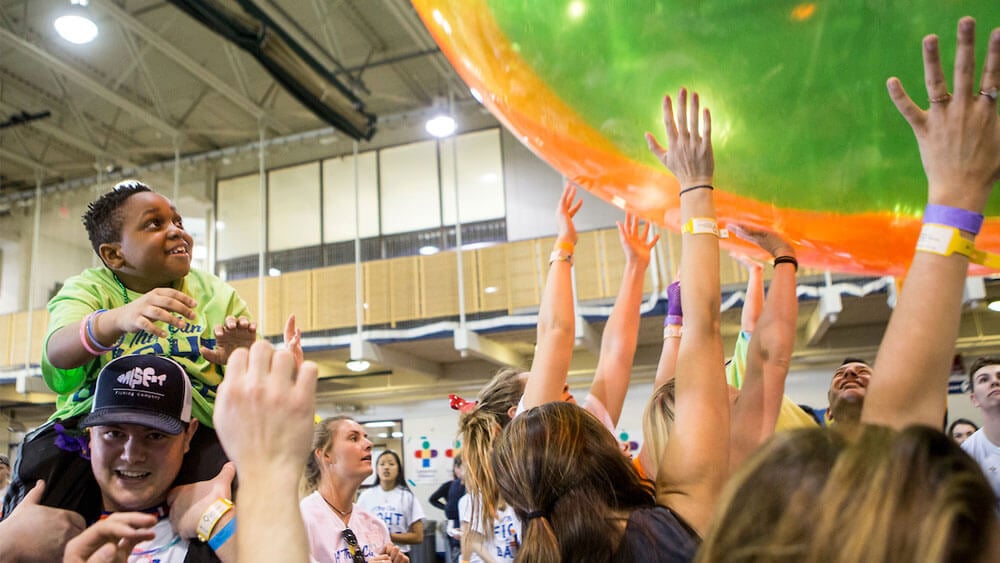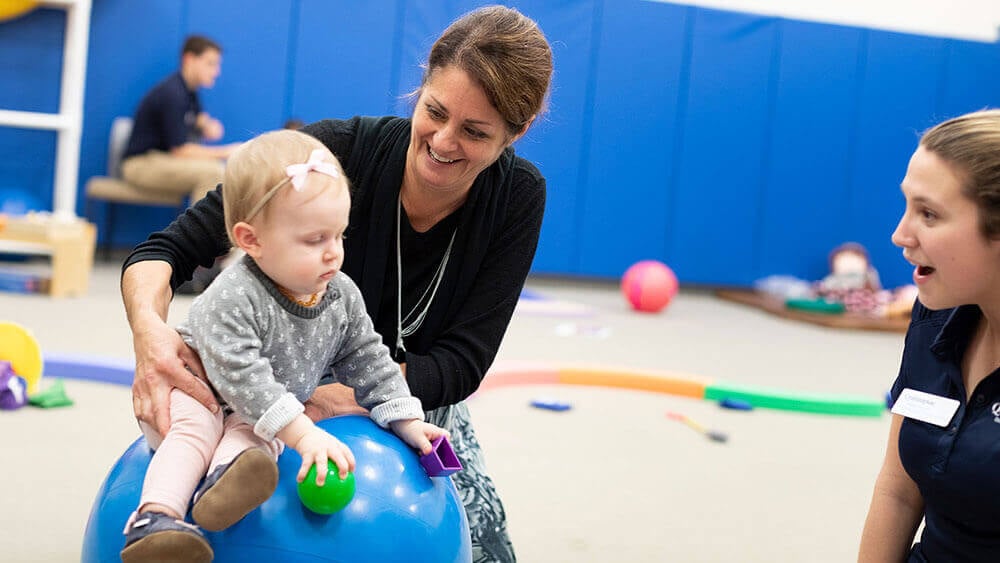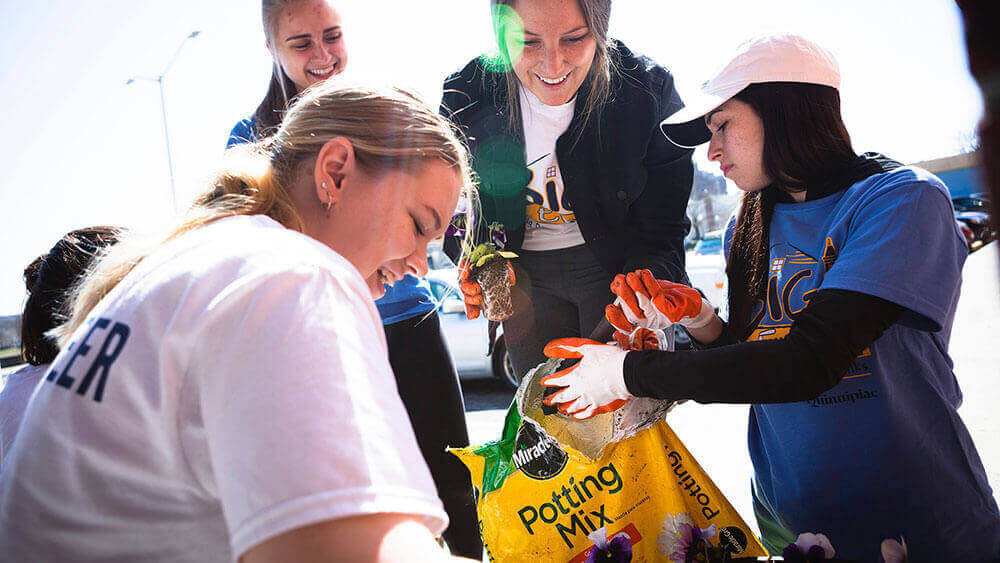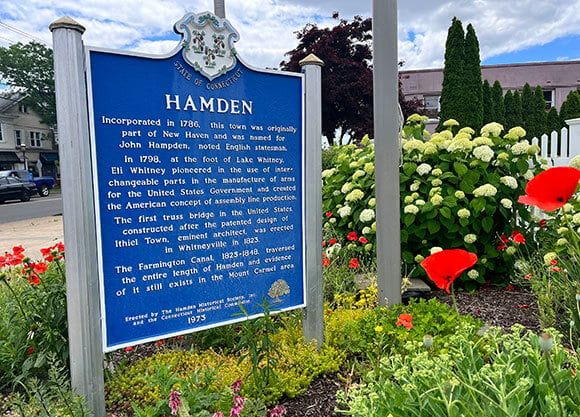
Community Service Opportunities
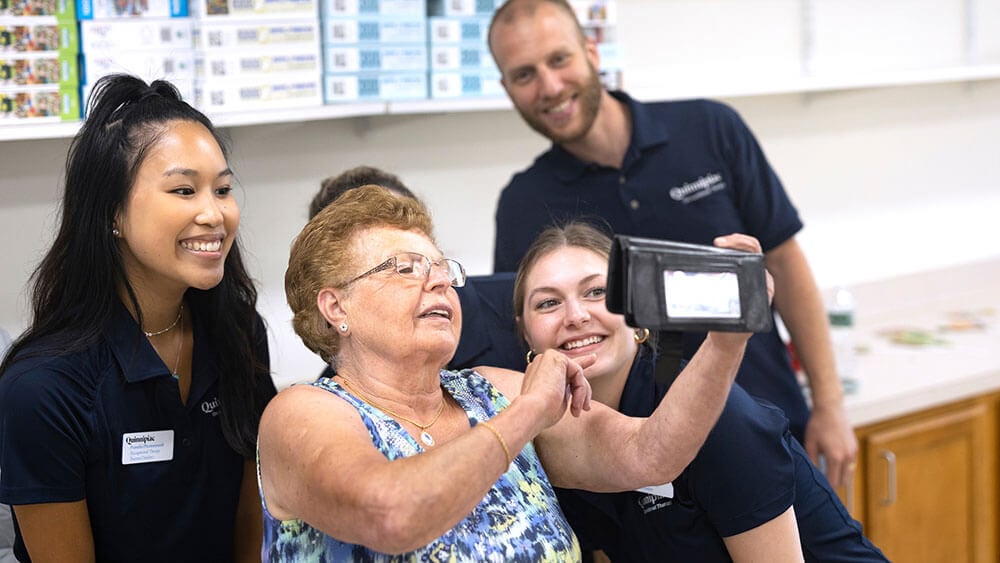
Community Service Opportunities
Quinnipiac strives to develop students to become enlightened citizens who lift communities and embrace inclusive excellence. As the University of the Future, Quinnipiac understands that in addition to nurturing its own faculty, staff and students, it also must use its intellectual, technical and community assets to support the needs of local and global communities.
By the Numbers
20K Hours
Community service hours performed by students, faculty and staff through various initiatives over a year.
$13,562 United Way Campaign
Contributions to the local community, 2023
$140,997 QTHON
Raised for the Children’s Miracle Dance Marathon, 2024
$25,129 Tap Out Hunger
Funds raised for local food networks, 2024
$165,885 Funds Raised
The amount of charitable dollars raised by fraternities and sororities for various local, national and international causes during the 2023-24 academic year.
Overview
Our community outreach efforts fall under two main categories: Advancing Social and Racial Justice, and Educating the Whole Person.
In addition to the Bobcat pride we all share when we give and support others, our students gain real-world experience and practice important habits like problem-solving, leadership, humility and time management. This outreach allows our Bobcats to apply their classroom learning to everyday scenarios that have real implications and to make positive changes.
We encourage you to get involved! A sampling of some of our service opportunities can be found below. For a full list of opportunities, or to get more information, please visit our Office of Community Service or contact our director of community service by emailing vincent.contrucci@qu.edu.
If you're a local community member looking to learn more about how QU positively impacts the Greater New Haven area, please visit our Community page.
University-Wide Community Events
Every year our students, staff and faculty members enhance the lives of our neighbors through exciting and engaging events. From having fun raising money while hitting the dance floor, to devoting one big day to assisting hundreds of local nonprofits, our Quinnipiac community is dedicated to serving our extended community.
The Big Event at Quinnipiac is a student-run day of service that has taken place annually since 2010. Every spring, between 1,400 and 1,600 students, faculty, staff, and alumni come together to help over 100 nonprofit organizations across the state by performing community service projects such as leaf raking, painting and volunteering at a local animal shelter. The Big Event builds community and campus unity gives us the chance to express our gratitude and commitment to the community.
Quinnipiac’s occupational and physical therapy programs host Camp No Limits, an overnight camp for children and adolescents with limb loss and their families, each summer on our York Hill Campus. Camp No Limits, which began at QU in 2015, is designed to increase the functional independence of children living with limb loss through participation in recreational programs. Camp participants develop self-confidence, achieve personal goals and form enduring friendships.
Hundreds of our students participate annually in QTHON, a dance marathon whose proceeds help local kids. QTHON is part of a nationwide, student-run movement involving more than 150 schools that support Children’s Miracle Network hospitals. Each year since 2010, QU students have raised funds and awareness for the local Children’s Miracle Network hospital, which provides life-saving treatments and health care services for children and their families. Even in the pandemic, our students found a way to continue this important fundraising outreach program.
Quinnipiac’s occupational and physical therapy programs host Camp No Limits, an overnight camp for children and adolescents with limb loss and their families, each summer on our York Hill Campus. Camp No Limits, which began at QU in 2015, is designed to increase the functional independence of children living with limb loss through participation in recreational programs. Camp participants develop self-confidence, achieve personal goals and form enduring friendships.
Educating the Whole Person
Through our mission to Educate the Whole Person, our students celebrate people of all abilities, create access to an age-friendly university, and deliver programs to promote the health of mind, body and spirit.
Creating Access to an Age-Friendly University
Students in all areas of study can participate in a free, 90-minute virtual information session to learn what it’s like to live with dementia, common myths/facts about dementia, and action steps to create a dementia-friendly community. After gaining an understanding, the students then become advocates in the community. Students interested in dementia can opt for further training to become a Dementia Friend Champion, providing education sessions to their communities.
In partnership with the town of Hamden and the Hamden Chamber Health & Wellness Council, QU community members donate gifts to local senior citizens for the holiday season to bring smiles to our neighbors' faces.
Health science students, mentored by faculty members, create memory books for those living with dementia and others at the end of their lives. Working with Masonicare, student “scribes” interview their subjects over five weeks and then create a Shutterfly book of photos and stories to record and celebrate their lives. Families and students come together for the book presentations. During this experience, students learn to interview a person from a narrative medicine perspective and to recognize that every person living with dementia is unique. Families have expressed how grateful they are to have such a keepsake.
Selected students live rent-free in apartments within the Masonicare community for two semesters and provide 8 hours of service per week to older adults residing at Masonicare in accordance with Quinnipiac’s academic calendar. The “students in residence” dine with individuals at Masonicare at least once weekly. Both the students and the Masonicare residents benefit from the sharing of wisdom and the intergenerational friendships that develop.
Occupational therapy students taking the course OT 326 — Principles of Human Development: Older Adults —spend two days with volunteers from the AARP organization to learn about ageism and trends on aging in America from the organization, which strives to shape the mindsets of future health care providers who will work with older adult clients. Students find this presentation inclusive, entertaining and interesting.
In partnership with the town of Hamden and the Hamden Chamber Health & Wellness Council, QU community members donate gifts to local senior citizens for the holiday season to bring smiles to our neighbors' faces.
Selected students live rent-free in apartments within the Masonicare community for two semesters and provide 8 hours of service per week to older adults residing at Masonicare in accordance with Quinnipiac’s academic calendar. The “students in residence” dine with individuals at Masonicare at least once weekly. Both the students and the Masonicare residents benefit from the sharing of wisdom and the intergenerational friendships that develop.
Promoting the Health of Mind, Body and Spirit
The EQUIP Rehabilitation Clinic seeks to reduce health disparities by providing direct and telemedicine pro bono treatment physical therapy services to the underserved population in Greater New Haven. PT students are encouraged to foster altruistic values while thinking critically and creatively. EQUIP for Life teams offer community-based exercise classes and wellness education, community screenings within the scope of PT practice, student wellness initiatives, and special events in conjunction with community partners. All graduate physical therapy students can become members of EQUIP, and students in their final year of the curriculum can apply to be in leadership roles on the EQUIP executive board.
Students and faculty members in the Physical Therapy Department collaborate with Faculté des Sciences Rehabilitation de Léogâne, the only occupational therapy and one of two physical therapy schools in Haiti, to develop, provide and support a curriculum. With this project, students have the opportunity to travel to Haiti to help implement this curriculum as they learn about the Haitian culture, differences in health care between the U.S. and Haiti, and health care disparity among Haitian Americans. Additionally, students learn about the value of education in Haiti through interaction with Haitian PT students and physical therapists.
Physical therapy students can complete a capstone course in collaboration with the Keefe Community Center in Hamden, providing education and fitness classes to Keefe clients and getting involved in their health fair. Students learn how to conduct a needs assessment and implement fitness and health programs to meet a community need.
Physical therapy students can choose a capstone course working with people with spinal cord injuries at Oak Hill, Connecticut's largest private provider of services to people with disabilities. Students create and lead exercise classes while providing education to clients.
Rare Disease Day is acknowledged globally on the last day of February to raise awareness of over 7,000 identified rare diseases and the individuals/family members affected. The School of Medicine hosts Rare Disease Day to provide an opportunity for patients, family members and researchers to share their stories and promote education, awareness and advocacy to our health care community. The event has become a powerful community-based learning opportunity for students and professionals.
Junior occupational therapy students visit elementary schools to educate students on backpack safety to prevent injuries from unsafe use. The students teach children how to pack, wear and adjust backpacks correctly using good posture. These lessons can lower the risks of sustaining injuries due to backpack weight. The students gain a broad world view by observing children of various ages and cultures and classroom management styles. They also become familiar with educating a diverse population while demonstrating leadership, exploring their comfort zone, and analyzing their interest in working with children.
Students and faculty members in the Physical Therapy Department collaborate with Faculté des Sciences Rehabilitation de Léogâne, the only occupational therapy and one of two physical therapy schools in Haiti, to develop, provide and support a curriculum. With this project, students have the opportunity to travel to Haiti to help implement this curriculum as they learn about the Haitian culture, differences in health care between the U.S. and Haiti, and health care disparity among Haitian Americans. Additionally, students learn about the value of education in Haiti through interaction with Haitian PT students and physical therapists.
Physical therapy students can choose a capstone course working with people with spinal cord injuries at Oak Hill, Connecticut's largest private provider of services to people with disabilities. Students create and lead exercise classes while providing education to clients.
Junior occupational therapy students visit elementary schools to educate students on backpack safety to prevent injuries from unsafe use. The students teach children how to pack, wear and adjust backpacks correctly using good posture. These lessons can lower the risks of sustaining injuries due to backpack weight. The students gain a broad world view by observing children of various ages and cultures and classroom management styles. They also become familiar with educating a diverse population while demonstrating leadership, exploring their comfort zone, and analyzing their interest in working with children.
Celebrating People of All Abilities
Best Buddies is an international, nonprofit organization dedicated to establishing a global volunteer movement to create opportunities for one-to-one friendships, integrated employment, leadership development and inclusive living for individuals with intellectual and developmental disabilities. Members in the community are "matched" with a QU chapter member seeking a "buddy." The buddies communicate weekly and plan activities to do together on their own. Students can elect to be a "social member" and not have a buddy, but attend social events once a month. Within the Quinnipiac chapter there are over 400 student members who assist with this program and attend meetings. The Cheshire chapter won best international chapter in 2013 and best chapter in Connecticut in 2019.
Each year the Quinnipiac women’s lacrosse team enters the Born to Run lacrosse tournament, a fundraiser hosted at UMass Lowell to provide aspiring athletes with prosthetics to continue or start their active lifestyle. The athletes are grateful to receive the prosthetics that allow them to play the sports they love.
Quinnipiac students volunteer each winter to teach children with disabilities to ski in this adapted skiing program sponsored by CCMC and Mount Southington. Their families can participate in this opportunity as well, developing confidence and skills as they discover a leisure activity the whole family can enjoy. Skiers Unlimited relies on QU student volunteers to serve as many children with disabilities as possible. Volunteering provides our students with the opportunity to develop teaching skills and understand the experiences of children with disabilities.
Physical therapy students work with FUNfitness, which is part of the Special Olympics. Twice a year, QU students screen about 150 athletes for strength, balance, range of motion and fitness. The students and faculty enjoy this opportunity to use their skills to give back to the Special Olympics community.
Each year the Quinnipiac women’s lacrosse team enters the Born to Run lacrosse tournament, a fundraiser hosted at UMass Lowell to provide aspiring athletes with prosthetics to continue or start their active lifestyle. The athletes are grateful to receive the prosthetics that allow them to play the sports they love.
Physical therapy students work with FUNfitness, which is part of the Special Olympics. Twice a year, QU students screen about 150 athletes for strength, balance, range of motion and fitness. The students and faculty enjoy this opportunity to use their skills to give back to the Special Olympics community.
Advancing the Development of Our K-12 and Adult Community Members
Quinnipiac Anthropology students create activities for middle-school students to learn about human evolution, human anatomy, archaeology and anthropology. About 100 middle schoolers visit the Center for Anthropological Research each year, where we provide a hands-on, immersive learning experience for middle-school aged students. We have hosted Hamden Middle School, the Alice Peck School, and the GEMS Program from the Bethany Community School.
The Best Practices Unconference is an innovative spin on a traditional conference. The School of Education’s QUeST-LC fellows, as well as other K-12 Connecticut science teachers who have attended QUeST-LC events, present strategies for Next Generation Science Standards based on the needs of participants. To date, we have served 156 science educators from 32 school districts.
Engineering students, specifically computer science and software engineering majors, help residents of Elim Park in Cheshire learn computer technology. Students in the Computer Science and Software Engineering year-long capstone courses meet several times with residents of Elim Park during the year to familiarize them with computers, social media and various computer-related devices. This enables residents of Elim Park to stay connected with the rest of the world, their families, and the news.
Students in the Cheshire-QU Transition program work on improving the education, employment and independent living skills needed for a successful transition from high school to adult living through the Center for Interprofessional Healthcare Education. Quinnipiac students of all majors mentor the high school students in ways that their teachers and therapists often cannot. Some popular programs include Driving and Community Mobility, the Summer Life Overnight Program, and an Interprofessional activity with pharmacy students from St. Joseph's University on medication safety.
This free, 10-week program for girls in grades 3-12 or women ages 18 and up teaches coding in a fun and friendly way several hours a week. The program’s mission is to close the gender gap in technology and change the image of what a programmer does while valuing diversity, equity and inclusion. This promotes computer science and software engineering.
The School of Education hosts a monthly two-hour workshop on Wednesdays to meet the needs of K-12 science teachers as they increase their understanding of how to implement the Next Generation Science Standards. To date we have served 276 science educators from 28 school districts as a primary resource for research-based teaching practices associated with the 2015 adoption of the Next Generation Science Standards in Connecticut.
Quinnipiac has served as the primary sponsor of the annual North Haven Education Foundation's community spelling bee. There are many teams representing all aspects of the North Haven community from the Garden Club and schools to Town Hall and the Fire Department.
The QU Advancing Diversity in Science (QUADS) program engages high school students in Connecticut school districts in the development of science skills and knowledge through a place-based science education experience. Supported by secondary science teachers (facilitators), QU students (mentors) and QU faculty, students engage in activities designed to make sense of a community-based phenomenon or to solve a community problem.
The Best Practices Unconference is an innovative spin on a traditional conference. The School of Education’s QUeST-LC fellows, as well as other K-12 Connecticut science teachers who have attended QUeST-LC events, present strategies for Next Generation Science Standards based on the needs of participants. To date, we have served 156 science educators from 32 school districts.
Students in the Cheshire-QU Transition program work on improving the education, employment and independent living skills needed for a successful transition from high school to adult living through the Center for Interprofessional Healthcare Education. Quinnipiac students of all majors mentor the high school students in ways that their teachers and therapists often cannot. Some popular programs include Driving and Community Mobility, the Summer Life Overnight Program, and an Interprofessional activity with pharmacy students from St. Joseph's University on medication safety.
The School of Education hosts a monthly two-hour workshop on Wednesdays to meet the needs of K-12 science teachers as they increase their understanding of how to implement the Next Generation Science Standards. To date we have served 276 science educators from 28 school districts as a primary resource for research-based teaching practices associated with the 2015 adoption of the Next Generation Science Standards in Connecticut.
The QU Advancing Diversity in Science (QUADS) program engages high school students in Connecticut school districts in the development of science skills and knowledge through a place-based science education experience. Supported by secondary science teachers (facilitators), QU students (mentors) and QU faculty, students engage in activities designed to make sense of a community-based phenomenon or to solve a community problem.
Advancing Social and Racial Justice
Through social and racial justice work, our students drive positive environmental efforts, work to increase access and equity for all populations, and strive to reduce food insecurity and homelessness.
Reducing Food Insecurity and Homelessness
At the end of the spring semester, our students are encouraged to donate leftover non-perishable foods by leaving them in a designated bin within their residence halls. Donated food items are then distributed to partnering nonprofit organizations. This food drive annually collects between 4 to 5 tons of food.
The women's lacrosse team works with the Ronald McDonald Foundation to cook breakfast for families staying at the Ronald McDonald House in New Haven while their children receive medical treatment in the nearby hospital. Cooking meals as a team allows for team bonding and character building as well.
Students from the Catholic Chaplaincy volunteer annually at the Connecticut Food Bank, sorting donated food for about 3 hours one Saturday in October. The Food Bank serves thousands of people in Connecticut, and it largely relies on volunteers to sort and deliver the food. This activity enables students to get involved in feeding the hungry and familiarizes them with charitable organizations in the area while putting their faith into action.
The women's lacrosse team works with the Ronald McDonald Foundation to cook breakfast for families staying at the Ronald McDonald House in New Haven while their children receive medical treatment in the nearby hospital. Cooking meals as a team allows for team bonding and character building as well.
Increasing Access and Equity for All Populations
Occupational therapy students sponsor the CarFit community-based educational program for seniors that helps them learn to adjust their cars to "fit" them. Senior drivers are evaluated and given recommendations on how to best adjust seat belts, seat height, distance from the steering wheel and mirrors.
Accounting students participating in the Quinnipiac University Volunteer Income Tax Assistance (VITA) program help low-income residents in the Greater Hamden and New Haven areas with income-tax preparation and filing under the guidance of faculty members who are certified public accountants. This program runs from mid-January through April 15 each year. During the Spring 2020 semester, students and supporting faculty assisted 230 taxpayers and saved VITA taxpayers approximately $63,000 in tax preparation fees.
Accounting students participating in the Quinnipiac University Volunteer Income Tax Assistance (VITA) program help low-income residents in the Greater Hamden and New Haven areas with income-tax preparation and filing under the guidance of faculty members who are certified public accountants. This program runs from mid-January through April 15 each year. During the Spring 2020 semester, students and supporting faculty assisted 230 taxpayers and saved VITA taxpayers approximately $63,000 in tax preparation fees.
Driving Positive Environmental and Sustainability Efforts
At the annual Eco Fashion Show/Creativity for Wellness, Quinnipiac students create clothing made from recycled materials and then debut their creations on a runway using fellow students as models. Materials have included coffee filters, scraps of used clothing, recycled receipts and shopping bags. The fashion show is an offshoot of a business course that focuses on sustainable business operations, ethical labor practices, circular business model, fashion production cycle, innovations within sustainability, and international perspectives on sustainable business practices.
In partnership with the Mill River Watershed Association, QU students, faculty and staff from the School of Engineering, College of Arts and Sciences and Albert Schweitzer Institute collaborated to install a rain garden and a berm to help absorb water runoff before it reaches the Mill River and storm drains. The newly installed rain garden will help keep pollutants from the water and will benefit animals and organisms locally, as well as downstream, creating a more pristine place for our surrounding communities.
In partnership with the Mill River Watershed Association, QU students, faculty and staff from the School of Engineering, College of Arts and Sciences and Albert Schweitzer Institute collaborated to install a rain garden and a berm to help absorb water runoff before it reaches the Mill River and storm drains. The newly installed rain garden will help keep pollutants from the water and will benefit animals and organisms locally, as well as downstream, creating a more pristine place for our surrounding communities.

